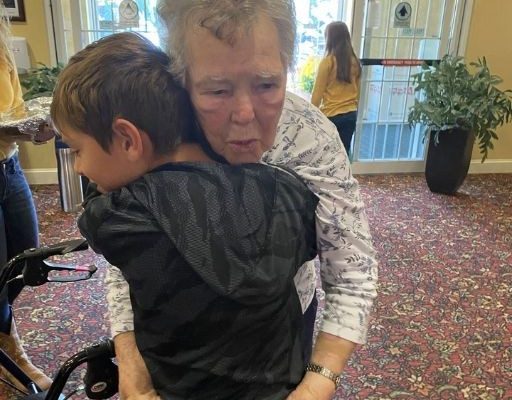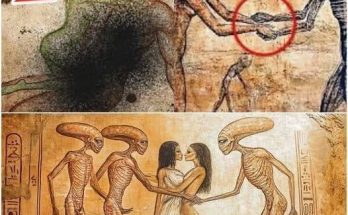We thought the visit would be sweet. A hug. A smile. Maybe even a cookie from the vending machine.
My son had picked out his shirt carefully, drawn her a picture, and practiced saying, “I missed you, Grandma.”
But the moment we stepped into the nursing home lobby, her eyes narrowed, and she asked sharply:
“Who is that boy? Why is he here?”
My son froze. His smile vanished.
He tried to hand her the drawing, but she recoiled, whispering, “You’re not my grandson. My Daniel is still five. You can’t be him.”
Daniel is eight now, tall and growing fast. But in that instant, he didn’t understand. His eyes filled, silently begging me to fix it.
I knelt beside him and whispered, “Grandma’s just a little confused. It’s okay.” But his tiny chest rose and fell too fast, his head shaking like the world had turned upside down.
The nurse nearby gave me a sorrowful look. “She’s been having more of these episodes. Sometimes she remembers. Sometimes she doesn’t.”
I wanted to whisk him away, shield him. But he clutched my hand firmly and whispered, “No. I want to try again.”
So we approached her chair. He pressed the picture to his chest like proof of who he was. “Grandma, it’s me. It’s Daniel.”
She studied him for a moment, then shook her head. “My Daniel is small. With little hands.”
His fists clenched, but he gently placed the drawing in her lap anyway. “I made this for you.”
She traced the crayon lines, then whispered, “This is sweet. But it’s not from you.”
And in that moment, my boy broke. Tears spilled down his cheeks as he buried his face in my shirt.
That night at home, he barely spoke. Pushed away his dinner. Skipped playtime. Curled under a blanket on the couch.
Finally, in a quiet, cracked voice, he asked, “Why doesn’t she know me anymore?”
I swallowed back tears. “Her mind is sick, sweetheart. It mixes things up. She still loves you—she just can’t always remember the way she used to.”
He whispered back, fierce and broken: “But I remembered her. I practiced. I drew. I remembered.”
For days, he carried that weight silently. No more running to me at school pick-up. No bedtime stories. Just a quiet heaviness.
Then one evening, I heard the scratch of crayons. He sat at his desk, paper scattered, drawing Grandma over and over—smiling, sitting in her chair, holding his hand.
“What are you making, buddy?” I asked.
“Proof,” he muttered without looking up.
The following weekend, he asked to visit again. I hesitated, wanting to protect him. But his steady eyes told me he needed this.
We packed the drawings into a folder and drove back.
When we entered, Grandma sat humming by the window. He opened the folder and spread the pictures across her lap. “It’s me. Daniel. Look. I drew us.”
Her lips moved as she studied them: “Little hands… cookies… the swing…”
He leaned in. “Yes, Grandma. The swing. That’s me.”
For one fragile moment, her eyes cleared. She touched his cheek. “Daniel?”
His face lit with hope. “Yes! It’s me!”
But the light flickered and faded. She shook her head again. “No… my Daniel is smaller.”
He snapped the folder shut, shoved it at me, and bolted down the hall sobbing. “She doesn’t want me anymore!”
I gathered him into my arms. “No, baby. She wants you. She just can’t hold onto the memories. It’s not you—it’s her illness.”
But he pounded his fists against my chest. “Then why did she remember the swing? Why did she smile—and then forget again? Why would she do that?”
I had no answer. Only the ache of helplessness.
That week, he shut himself away, crying into his pillow at night. I feared I’d made a terrible mistake bringing him back.
But children surprise you. They break, and then they rebuild in ways you don’t expect.
A week later, he marched into the kitchen with a shoebox. “I’m going to try again,” he said firmly.
Inside were little treasures: photos, drawings, a button from her old sweater, a toy car she once gave him. “This time,” he said, “I’ll remind her with things she already loved.”
So we went.
Grandma sat in the garden near the roses. Daniel carefully laid each item on her lap. She lifted the toy car, rolled it in her palm, and a tear slipped down her cheek.
“Daniel,” she whispered. “You cried when you lost the red one. We found it under the couch.”
His gasp was pure joy. “Yes! That was me!”
She looked at him, soft recognition flickering in her tired eyes. “You’ve grown. My little Daniel got taller.”
He threw his arms around her, laughing and crying at once. She hugged him back, fragile but real.
On the ride home, he whispered, “She knew me. Even if just for a little. She knew me.”
From then on, visits changed. He no longer expected perfect recognition. Instead, he came to remind her—reading stories, showing schoolwork, bringing flowers. Some days she called him by the wrong name, or insisted he was still five. But every once in a while, her eyes cleared, and she saw him.
And those moments, however brief, were enough.
The real twist came months later. The nursing home called: “Your mom woke up asking for Daniel. She said, ‘Bring me my grandson, the one who draws pictures.’”
When we arrived, she was waiting, shoebox in her lap. Her eyes searched the door until she saw him. “There’s my Daniel,” she whispered, smiling.
He ran to her, hugging her tight. “I’m here, Grandma.”
She kissed his head. “Don’t let me forget again. Keep reminding me. Promise?”
He nodded fiercely. “I promise.”
And that became their ritual. Each visit, he brought something—an old photo, a new drawing, a story from school. Each time, he gave her a reason to remember, even if only for moments.
He no longer feared her forgetting. Instead, he found purpose in helping her remember.
One evening, on the way home, he said quietly: “Maybe it’s okay if she forgets sometimes. Because then I get to help her remember again. And that’s kind of special.”
That was when I understood: the twist wasn’t in Grandma suddenly recovering. It was in my son discovering a love deeper than I ever imagined an eight-year-old could carry.
Love isn’t erased by memory loss. It survives in reminders, in patience, in showing up again and again.
And sometimes, being remembered isn’t the greatest gift. Sometimes, it’s reminding someone else that they are loved.



